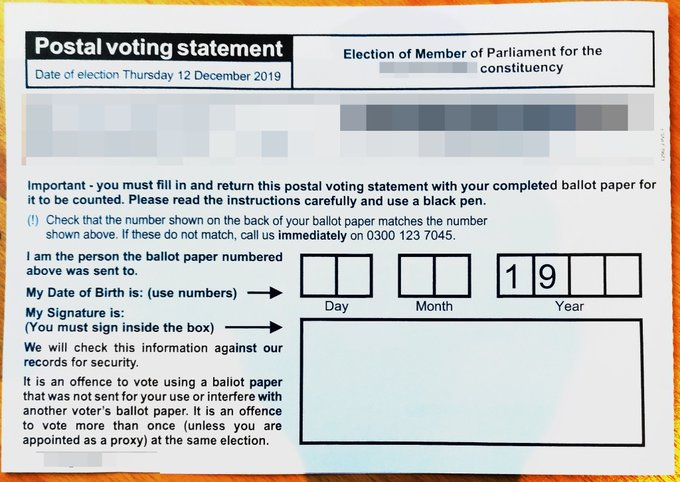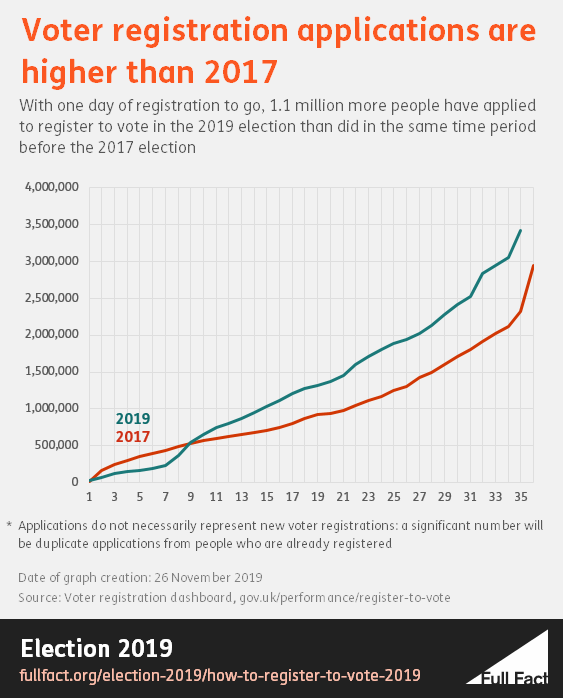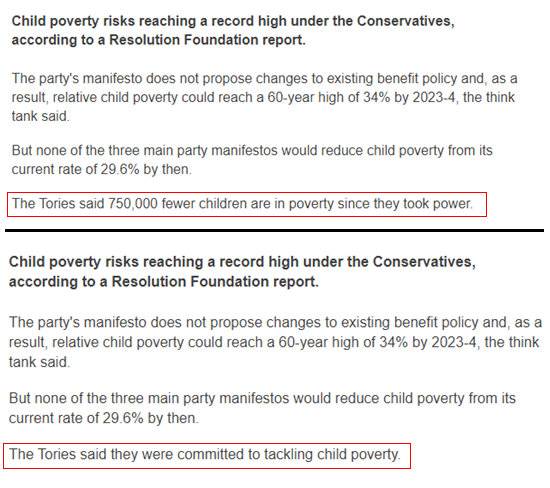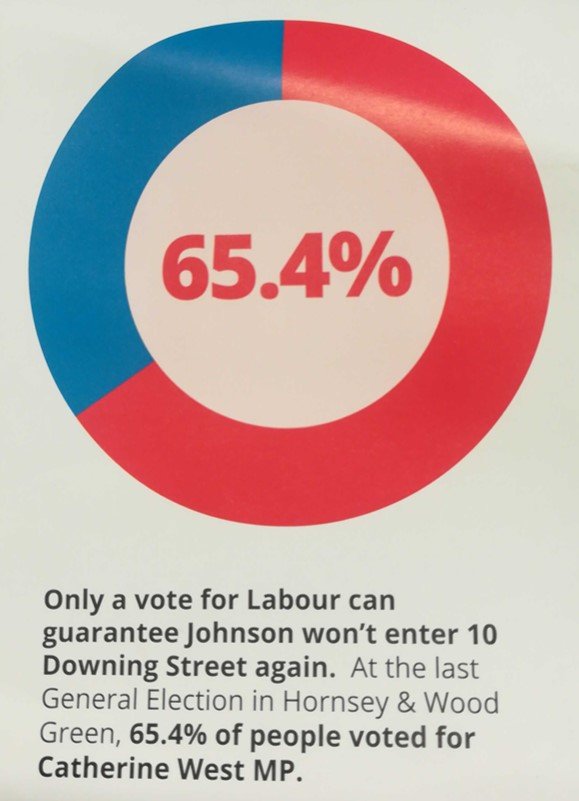Labour isn’t ditching the single occupancy council tax discount
We’ve seen this claim across social media today: that Labour would get rid of the 25% single occupancy discount on council tax. These claims have been shared well over 20,000 times on both Twitter and Facebook.
This is not Labour policy.
It seems to stem from some confusion over a Labour-commissioned report from earlier this year, which did say that the single occupancy discount encouraged inefficient use of housing stock. But a policy to scrap it isn’t in the manifesto or costings document.
You can read our full piece here.
Honesty in public debate matters
You can help us take action – and get our regular free email
Subscribe to weekly email newsletters from Full Fact for updates on politics, immigration, health and more. Our fact checks are free to read but not to produce, so you will also get occasional emails about fundraising and other ways you can help. You can unsubscribe at any time. For more information about how we use your data see our Privacy Policy.
Councils aren’t using postal ballots to suppress the youth vote
We’ve seen a few posts going round social media today claiming that the date of birth section on postal ballots is being pre-filled with the year starting “19” like this.

We don’t think there’s anything to be worried about here. We contacted Bromley council who said that they do pre-fill the date of birth on postal ballots, but that voters born in 2000 or 2001 would receive a ballot prefilled accordingly with “20..”
That was also the response of Cheshire West and Chester Council, the source of another of the questioned ballots.
Postal ballots are pre-filled like this to discourage people writing in the current date, rather than their date of birth.
Bromley Council told us that the chance of someone receiving an erroneously pre-filled ballot was very small, but that if anyone born in the 2000s does, they should just cross the “19” out and write their actual year of birth above.
On an (electoral) roll
Did you know that today is the last day you can register to vote in the election on December 12? Well, it is. You've got until 5pm to register for a postal vote (unless you're in Northern Ireland, in which case it's too late), and until 11.59pm to register to vote in person (that includes in NI).
We've written a helpful guide to everything you need to know about registering to vote.
This election campaign has seen significantly higher applications for voter registration than in the same time period before the 2017 general election.
But it's worth noting that this doesn’t mean they are all new voters. Based on previous votes, a significant number will be duplicate applications from people who were, in fact, already registered to vote.

BBC deletes inaccurate child poverty claim
The BBC reported this morning on analysis predicting that child poverty is expected to rise under the Conservatives’ plans for government.
The Resolution Foundation think tank estimated that, because the party's manifesto does not propose changes to benefits, relative child poverty could reach 34% by 2023/24.
The BBC included a response from the Conservatives challenging the report which they reported as: “The Tories said 750,000 fewer children are in poverty since they took power.”
This claim is incorrect. No measure of child poverty shows a fall of 750,000 since 2010—most of the main measures show a rise. The measures that do show a fall put it at about 100,000, well short of the amount claimed.
The line was on the BBC website for most of this morning, but in the past hour the BBC has removed the claim from its article. At time of writing, the claim is still in the BBC’s morning news roundup.

It’s possible the BBC misquoted a Conservative quote to the Guardian, which the BBC actually quotes in full later on in its article. The Conservatives said that “We are committed to tackling child poverty and have made progress since we came into government – with 730,000 fewer children in workless households.”
The 730,000 figure is correct and shows the change in the estimated number of children in workless households between April to June 2010 and 2019. But it’s not a measure of poverty.
We’ve asked the BBC to confirm if the figure was misquoted, or if the Conservatives actually sent them the inaccurate claim.
NHS funding boost not at record levels
The Prime Minister has repeatedly made claims that the NHS is set to receive £34 billion and described this in a number of ways: as the biggest spending increase in modern memory, or a “record sum” or the biggest boost for a generation.
It’s certainly not a record sum and whether or not you think this is the biggest increase in modern memory really depends on how good your memory is.
The £34 billion is a spending increase in real terms of £20.5 billion between 2018/19 and 2023/24 (this was first announced in July 2018). The last time spending increased by at least that amount in real terms was between 2004/05 and 2009/10, when it increased by £24 billion in real terms.
We've written more about this here.
Conservatives repeat misleading £2,400 cost of Labour figure
During his Conservative manifesto launch speech, Boris Johnson said Labour’s plans mean “higher taxes for everybody in this country, £2,400 extra.” The claim also appears in the Conservative manifesto.
This figure was first calculated by the Conservatives before the publication of Labour’s manifesto, so we called the calculation “largely meaningless”, as the Conservatives couldn’t know, at the time, exactly what Labour’s policies were.
Now that Labour’s manifesto has been published, we know it proposes £83 billion of increased spending by 2023/24. Labour has since announced compensation for the WASPI women at a cost of up to £58 billion in total (so an additional £11.5 billion per year).
If you divide that £83 billion figure by the number of income tax payers in the UK, it gives you a figure of roughly £2,600, or adding in the funding for WASPI women, the figure would be £3,000. But those figures are meaningless. They don’t mean that every income tax payer will have to pay this to fund the pledges.
That’s because Labour does not plan to fund its spending pledges through higher income tax for everybody (and even if it did, the cost would fall disproportionately on higher earners).
Labour doesn’t plan to raise income tax for those earning under £80,000 a year, and says that this increased spending will mainly be funded through taxes including corporation tax, a financial transactions tax, and higher income tax for those earning over £80,000 a year.
The IFS says that “it is unlikely that one could raise the sums suggested by Labour from the tax policies they set out.”
So Labour’s calculations have their problems, but it’s wrong to suggest that every income tax payer in the UK will fund every penny of Labour’s additional spending, and in equal amount.
Please do-nut publish misleading charts
A leaflet from Catherine West, the Labour party candidate for Hornsey and Wood Green, includes the following doughnut chart as evidence that “only a vote for Labour can guarantee Johnson won’t enter 10 Downing Street again.”

It claims to show the result of the 2017 general election in the constituency. It’s correct that Ms West won 65.4% of the vote as the Labour candidate. But the rest of the doughnut chart being blue suggests that the Conservatives took the remaining 34.6% of the vote.
That’s misleading. The Liberal Democrats took 16.1% of the vote, the Conservatives took 14.8% and the Greens took 1.9%.
Honesty in public debate matters
You can help us take action – and get our regular free email
Subscribe to weekly email newsletters from Full Fact for updates on politics, immigration, health and more. Our fact checks are free to read but not to produce, so you will also get occasional emails about fundraising and other ways you can help. You can unsubscribe at any time. For more information about how we use your data see our Privacy Policy.
Digesting the Conservative manifesto
Good afternoon. The big story yesterday was the launch of the Conservative manifesto, which we wrote about here.
In particular we looked at how the pledge to recruit 20,000 more police officers won’t restore the number lost since 2010, and how the pledge to recruit 50,000 “more nurses” hasn’t actually factored in the cost of eventually paying their salaries.
We’ve also examined comparisons between the day-to-day spending pledges of the three main UK parties. While the Conservatives have only pledged £3 billion a year of extra day-to-day spending in their manifesto, that doesn’t include pledges to increase spending on things like the NHS and schools made before the election.
Today, among other things, we’re looking at other claims made yesterday on the Andrew Marr show from Plaid Cymru leader Adam Price on the support for Welsh independence, and Angela Rayner on how many women are in poverty because of the changes to state pension age.
We’ve also written about why Labour had to correct its broadband costings in its manifesto.
And from the Mail, please watch this amazing video of Michael Crick exposing a ruse from a Conservative party candidate.
How comparable are the costings in the party manifestos?
Following the launch of the Conservative manifesto, journalists pointed out the big difference between the levels of increased current (day-to-day) spending promised by the three main parties.
It’s important to note that the manifestos (in general) do not include spending that will increase in the future but has already been announced. The costings for the Conservative manifesto only include new spending announcements made since the election was called.
For example, the Conservative manifesto spending list doesn’t include its already-announced pledges to:
- Increase school funding in England, worth £4.3 billion per year by 2022/23 (the Conservatives wrongly give a higher figure by ignoring inflation and adding up multiple years.)
- Increase spending on the NHS averaging £20.5 billion per year (again the Conservatives use a higher figure which ignores inflation).
- Recruit more police officers at a cost of £1 billion from 2019 to 2020.
So while the Conservatives plan to increase annual current spending by £3 billion compared to what’s already been announced, overall they plan to spend a lot more than £3 billion extra per year than we spend today.
It’s not clear to what extent the other parties would continue all of the previous spending commitments made by the government.
Since the Labour party manifesto was launched, they have also announced a major spending commitment on women’s pensions which was not mentioned in the manifesto.
BBC Question Time leaders special: Jeremy Corbyn fact checked
In the BBC Question Time leaders special, Jeremy Corbyn said of the options that would be included in Labour’s planned second referendum: “This will be a trade deal with Europe or remaining in the EU, that will be the choice that we put before the British people within six months. Any other option will require years of negotiations, either with the EU or the USA and put our public services at risk.”
This is not Labour’s position. Labour’s proposal is not to negotiate a trade deal with the EU before the referendum (which they have promised within six months of being elected). They propose to renegotiate the withdrawal agreement, and the non-binding political declaration on the future trade relationship between the EU and the UK, but this is not the same as negotiating a trade deal.
The EU has said that it will not begin negotiations on a trade deal (and other aspects of the future relationship) until a withdrawal agreement is ratified.
It’s possible that Mr. Corbyn simply misspoke when he said “trade deal”, but his subsequent comments that “any other option will require years of negotiations” add to the confusion.
If Leave were to win the referendum on Labour’s renegotiated withdrawal agreement, the UK would still have to finalise its new relationship - we don’t have enough details on what Labour’s Leave deal would mean to know how difficult that would be, and therefore how long it would take to negotiate and ratify a new agreement.
If the UK wanted to join an established organisation like the European Economic Area (the arrangement that allows Norway, Iceland and Lichtenstein barrier-free access to the Single Market), that could be easier to agree than a comprehensive free trade deal - but other EEA members would need to agree the UK should join. Labour has not so far said this is what it wants, talking instead of a “strong economic relationship” based on “close alignment.”
If Labour wanted to negotiate a bespoke trade deal with the EU, that would likely take longer. There is no realistic prospect of Mr. Corbyn’s trade deal being in place immediately after a second referendum result.
Mr. Corbyn also said, when talking about Labour’s tax policies, “95% of the population will pay no more whatsoever in tax. The top 5% will pay a bit more.”
This is wrong: Labour does propose some tax changes that would result in some of the 95% paying more. As we wrote in our fact check of Labour’s manifesto: “It’s correct that the Labour manifesto plans no increases in VAT, income tax or National Insurance for people earning less than £80,000.
It’s also correct that people earning less than £80,000 account for around 95% of taxpayers (somewhere between 95% and 96% according to 2016/17 figures from HMRC).
But that doesn’t mean Labour plans no tax rises whatsoever for these people, because there’s more to tax than just VAT, income tax and National Insurance.” For example, as an audience member pointed out, Labour’s manifesto commits to scrapping marriage allowance.
The Institute for Fiscal Studies manifesto analysis said: “If you want to transform the scale and scope of the state then you need to be clear that the tax increases required to do that will need to be widely shared rather than pretending that everything can be paid for by companies and the rich.”
You can read more on this issue in our fact check of the manifesto.